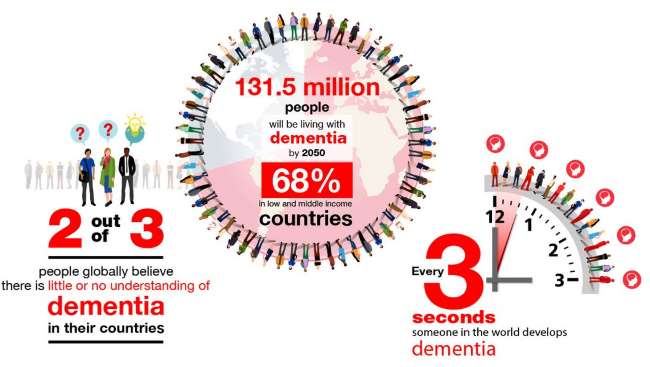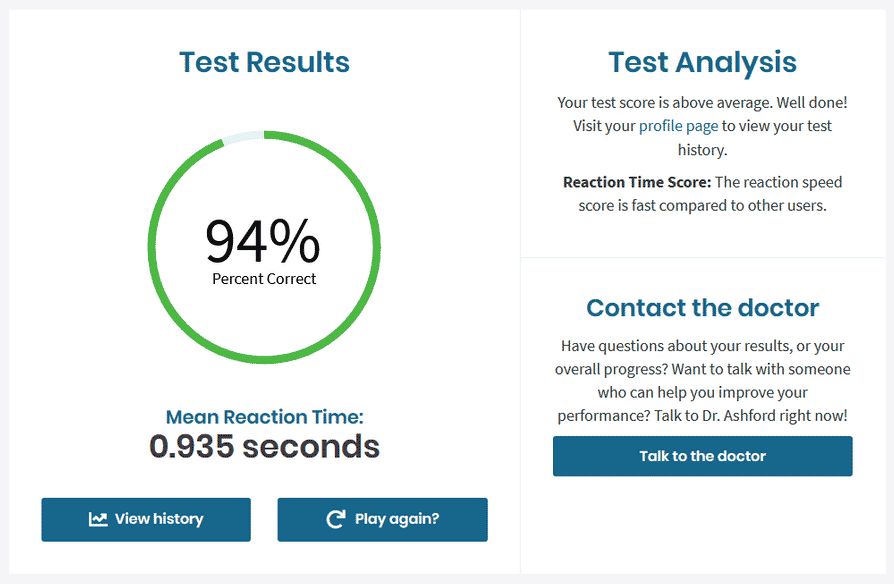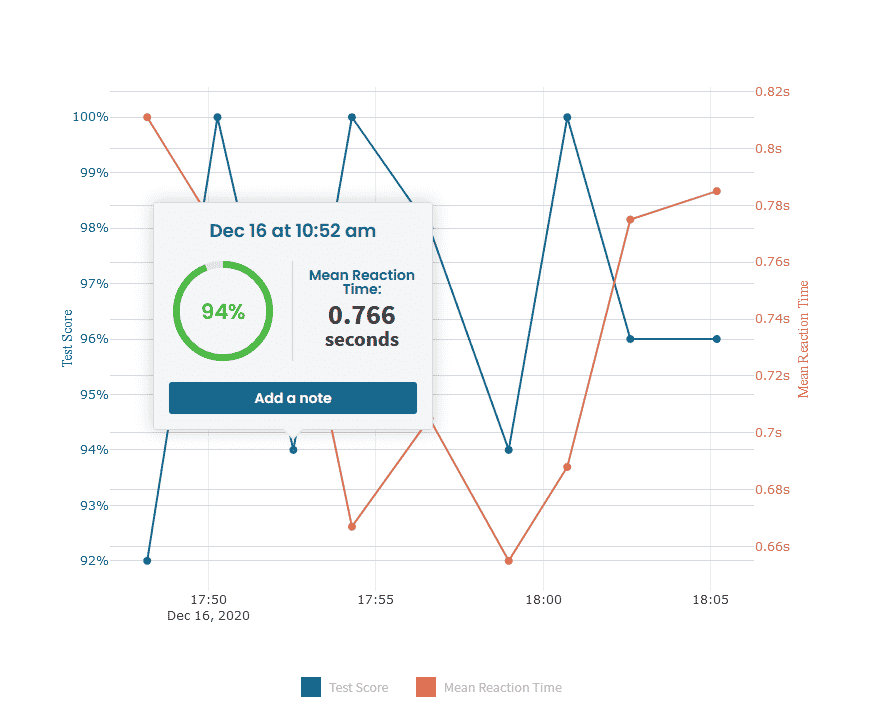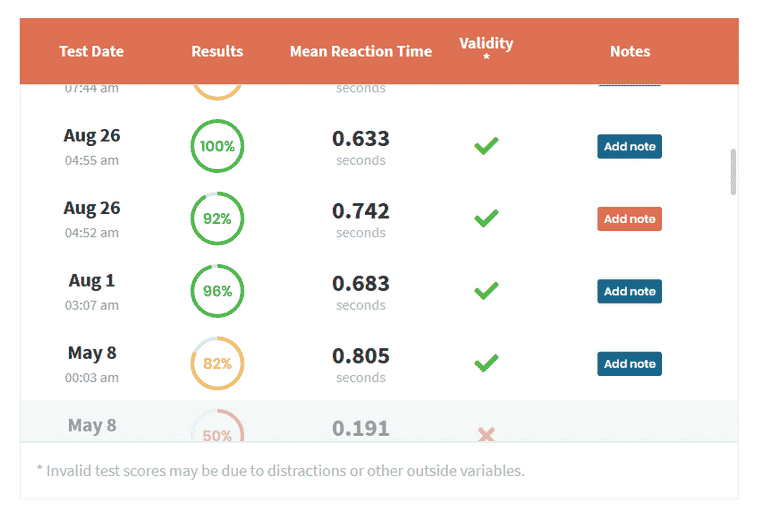The Free Online Memory Test
How good is your memory?
Take the #1 test doctors & researchers trust. Early detection of brain problems with visualized results to help you spot warning signs, before its too late. MemTrax™ is quick, simple, and can be used anywhere - anytime.
100% Anonymous | No Credit Card Required







Trusted by Top Doctors and Non-Profits

Dr. J. Wesson Ashford M.D. Ph,D.
Stanford Research & Veterans Affairs Hospital Psychiatrist

Charles Fuschillo Jr.
The Alzheimer's Foundation of America
Chief Executive Officer

Dr. Amos Adare M.D.
Neurosurgeon
Neurosurgery at Yale Medicine



Memory Test for Improved Care
Detect Brain Problems Early
Check you memory often, get a real picture of your memory over time.
Keep Track of Memory Loss
Early detection is important for early intervention and care which may add years to your life.
Unlimited Memory Tests
No waiting. Take unlimited memory tests: 24/7 any time, any place.
How Good is Your Memory? A Memory Test for Everyone
Dementia Stages: Why It’s Important to Recognize Them
The MIND Diet: A Brain Food Diet to Protect Against Cognitive Decline
Best Magnesium Supplement: 7 Forms of Magnesium for Improved Health
Brain Fog & Covid Symptoms
Walking for Mental Health and Memory: The Surprising Benefits



Memory Test: How Good is Your Memory?
Do you ever worry that your memory is slowly starting to fail? You’re not alone. Millions of people worldwide are affected by memory loss, which will only increase as the population ages. Memory loss can be caused by various things, including Alzheimer’s Disease, stroke, and head injury.
The good news is that there are ways to prevent memory loss or slow its progression. One way to do this is by taking regular memory tests. A memory test can help you identify areas where your memory might be weak and work on improving those skills.
Many types of memory tests are available online, and many are free to use. So why not give one a try today? It could be the first step in preserving your precious memories for years to come!
What is a memory test?
A memory test is a way to measure your memory function. There are many different types of memory tests, but they all involve you remembering something and then being asked to recall it later. Memory tests can diagnose memory problems, track memory changes over time, or simply see how good your memory is.
How good is your memory?
Memory loss is a common problem as we age, but did you know that Alzheimer's Disease is the most common form of dementia?
The Alzheimer's Foundation offers a free memory test to help you determine how good your memory currently is. This test can help you understand your risk of future Alzheimer's disease.
Lack of sleep: when you haven't had enough sleep, studies have shown that this can negatively affect your memory.
Stress and/or anxiety: usually stress and anxiety are caused by feelings of being overwhelmed, and as the mind tries to cope, it can make it more difficult for you to concentrate and remember things.
What is a short-term memory test?
A short-term memory test is a test that measures your ability to remember information over a short period. It usually involves remembering a list of words or numbers or recalling details from a story.
There are many different ways to test your short-term memory. One standard method is the digit span test, which involves repeating a list of numbers forward and backward.
Why is it important to test your short-term memory?
Your short-term memory is essential for everyday tasks such as remembering where you parked your car or recalling the name of a person you just met. It also plays a vital role in learning new information.
What is a long-term memory test?
A long-term memory test is a test that measures how well you can remember information over time. It usually includes a list of words or phrases you must remember, and then you are asked to recall them after some time has passed. The test may include tasks like remembering a story or a list of objects.
Why is it important to test your long-term memory?
There are many reasons why you might want to test your long-term memory. Maybe you're concerned about cognitive decline or just want to know how good your memory is.
Free Memory Test
Do you know how good your memory is? Test it with this free test! Just answer a few questions and find out how well you remember things. Multiple forms are provided to reduce practice effect for patients who may take the test more than once and are useful when rapidly screening larger numbers of individuals at the same time.
What's the best way to test your memory?
There are lots of ways to test your memory. You could try taking a test online or asking family members to help you test your memory. You could also try testing your memory with a cognitive test.
Test of Working Memory Performance
The test of working memory performance is a test that assesses an individual's ability to remember and process information. The test consists of three parts: the first part measures an individual's ability to remember information, the second part measures an individual's ability to process information, and the third part measures an individual's ability to recall information.
The test of working brain performance is a test that is commonly used to assess cognitive abilities. The test is a good predictor of academic achievement and correlated with intelligence measures. The design is simple to use, and the test results are easy to understand.
Overcoming Memory Problems
We all know that memory is essential. After all, it's one of the things that makes us human. But what happens when our memory starts to fail us?
Several cognitive issues can lead to brain problems. These include:
- Alzheimer's
- dementia
- brain injury
- stroke
Fortunately, there are several ways to test for these issues. And with the help of modern medicine, we can often overcome them.
So, if you're worried about your memory, don't be afraid to take a test. It could be the first step to a healthier brain.
Why and how to take the test?
The connection between memory and aging is well-documented in research. As we age, it's normal for our memory to decline. This can be a frustrating experience, but there are things you can do to help keep your memory sharp.
One way to stay on top of your cognitive health is to take a memory task test. Many sites offer free memory tests that only take a few minutes to complete.
These tests are a fun way to see how your memory stacks up, but they can also help spot early signs of dementia or another cognitive decline. If you notice a significant drop in your score from one test to the next, you should talk to your doctor.
The Instrument cannot substitute medical advice, diagnosis, or treatment by a trained medical professional.
FAQ
How can I test my memory?
There are a few ways that you can test your memory. One way is to use the connection method. This means making a connection between what you want to remember and something that you already know.
How to recall events?
There are different ways to approach this. One way is to try and think of as many specific details about the event as possible. This includes who was there, what happened, where it took place, and so on. The more specific you can be, the easier it will be to remember the event.
Another way to approach this is to think of the event as a story. This means thinking about what happened before and after the event and the main characters involved. This can help you remember the event more linearly, which can be easier for some people.
What is the 5-word memory test?
The research on this site is from the psychology department at the University of Washington. The test is called a "free recall" memory test.
You are shown a list of five words for two seconds, then asked to write down as many of the words as you can remember. After that, you are given another list of five words and asked to write down as many of the words as you can remember.
The research shows that people can recall more words from the second list than from the first. This is because the first list of words takes up "working memory space" and prevents people from recalling words from the second list.
What is the best test for memory?
The answer to this question depends on what you are looking for in a memory test. If you are looking for a general assessment of your memory, a number of intelligence tests include memory measures. These tests, however, only give you a snapshot of your current abilities and cannot predict future performance or changes in memory.
How do I know if my memory is failing?
There are a few key indicators and symptoms that your memory may not function as well as it used to. One is how often you have to ask people to repeat themselves or give you information that you should remember but don’t. If this happens frequently, it could indicate that your memory isn’t what it used to be.
Another sign that your memory may be slipping is if you start forgetting important things, like where you put your keys or what time your doctor’s appointment is. If you have to rely on notes and reminders more than you used to, it could be time to see a doctor about your memory.
A doctor can administer several memory tests to determine if your memory data loss is due to normal aging or if it’s something more serious. These tests usually involve recalling lists of words or numbers and may include questions about recent events.
If you’re concerned about your memory treatment, the best thing to do is to talk to your doctor. They can help you determine if your memory loss is typical or if it’s something that needs to be further investigated.
Types of Memories
There are many types of memories. This types of memory serves a specific purpose in helping us remember information. If you would like to learn about different types of memory in detail we go into it in more depth in the article - Different Types of Memory.
The Human Memory Systems
The human memory is fascinating, and scientists are still working to understand its quirks and capabilities. Memory can be broadly divided into three types: working memory, short-term memory, and long-term memory.
How does the human memory storage works?
The working memory is where information is actively processed and manipulated. Short-term memory is where information is temporarily stored, for example, when you are repeating a telephone number to yourself so that you can remember it. The sensory memory remembers information perceived through the senses, such as the sound of someone's voice or the sight of a face. When we recall memories, they often pass through all these stages before being stored in long-term memory.
Short-term Memory Explained
Short-term memory, also known as working memory, is the type of memory that allows us to remember and process information for a short period. This memory is essential for everyday tasks such as remembering a phone number long enough to dial it or remembering what you need to buy at the grocery store.
Short-term memory is believed to be stored in the prefrontal cortex and hippocampus of the brain. Short-term memory capacity is around seven items, plus or minus two. This means a person can usually remember between five and nine items simultaneously.
The duration of short-term memory is also thought to be limited. One theory suggests that short-term memory can only store information for up to 30 seconds. However, other research has shown that people can remember information for extended periods if asked to perform a task, such as repeating the information aloud or using it to solve a problem.
One way to think of short-term memory is like a mental notepad. It allows us to jot down a few pieces of information so that we can use them later. However, if we don’t transfer the information from our short-term memory into long-term memory, it will eventually be forgotten.
Long-term Memory Explained.
There are three primary types of long-term memory: semantic, episodic memories, and procedural.
Semantic memory refers to the collection of general knowledge about the world. This includes information about concepts, ideas, and facts. This memory lets us know what a chair is and how to use it.
Episodic memory refers to our personal experiences and memories. This memory allows us to remember what we did yesterday or where we went on vacation last year.
Procedural memory is responsible for our ability to learn new skills and perform specific tasks. This memory helps us tie our shoes, ride a bike, or drive a car.
All three types of long-term memory are essential for our everyday lives. Without semantic memory, we would not be able to communicate with others or understand the world around us. Episodic memory is vital for our well-being and helps us connect to others. Procedural memory is essential for performing many of the tasks we take for granted.
While all three types of long-term memory are essential, semantic and episodic memory are the most well-studied. Researchers believe that procedural memory may be more challenging to study because it is often implicit, meaning that we are unaware of the skills or knowledge we have acquired.
Whether semantic, episodic, or procedural, all long-term memories are stored in the brain. The exact location of these memories is still unknown, but scientists believe they are distributed throughout the cortex. The cortex is the brain's outermost layer and is responsible for many higher-level functions, such as language and decision-making.
Working Memory Functions Explained
You might be familiar with the term “working memory” from your days in school. Working memory is the type of memory that allows you to hold onto information long enough to use it. It’s what allows you to remember a phone number long enough to dial it or remember an instruction long enough to follow it.
It is vital for everyday tasks but can be essential in the classroom. That’s because students need to be able to remember information long enough to understand it and use it in their work.
Working memory, is the type of memory that allows you to hold information for a short time so you can use it. This memory is essential for everyday tasks like remembering a phone number or following instructions.
Sensory memory
Sensory memories recall of a sensory experience, such as what we see, hear, feel, or smell. It does not involve conscious processing and fades quickly unless it becomes "encoded" into short-term or long-term memory.
Implicit Memory
Implicit memories, also called non-declarative memory, is a type of long-term memory that doesn't require conscious thought to retrieve. It's the type of memory we use when performing skills or tasks that have become automatic, like riding a bike or tying our shoes.
Explicit Memory
Explicit memory refers to a type of long-term memory that allows us to recall information consciously. Explicit memories include memories of people, places, events, and experiences. Semantic memories is a type of explicit memory that stores general knowledge about the world, such as countries' names or the United States' capital. Episodic memory is another type of explicit memory that stores specific episodes or events from our lives, such as a particular vacation or birthday party.
Iconic Memory
It is a type of sensory memory that pertains to visual information. Cognitive psychologist Ulric Neisser first proposed it in 1967. He found that participants could accurately recall an image they had seen for just a few milliseconds.
However, iconic memory is not perfect. A study by Sperling (1960) found that people could only recall about four items from a list of several dozen presented for just a few seconds.
While our iconic memory is not perfect, it is still an important part of how we process and remember information. It allows us to quickly store visual information so that we can access it later on.
Autobiographical Memory.
Autobiographical memory is our memory of specific events that have happened to us. This type of memory is often very vivid and clear. We can remember these events' who, what, where, when, and why. Autobiographical memories are usually happy ones- like a first kiss or graduation. But they can also be harmful, like a car accident or the death of a loved one.
Echoic Memory.
Echoic memory is our memory of auditory stimuli- what we hear. It isis thought to last for up to four seconds. This type of memory is essential for things like following conversations and remembering warning sounds. It is often compared to a tape recorder- it just takes a few moments to store the information.
FAQ
How do we recall memories?
There are three types of memory: free recall, cued recall, and serial recall. Lumosity, is not good.
Free recall is when we try to remember a list of items without cues. A cued recall is when we are given a prompt or cue to help us remember the information. Serial recall is when we have to remember items in a particular order.
Different brain regions are responsible for different memory functions. The hippocampus is responsible for long-term memories and spatial navigation. The amygdala is responsible for emotional memories. The prefrontal cortex is responsible for working memory and short-term memory recall.
What parts of the brain are associated with memory recall?
The hippocampus is the part of the brain that is most associated with memory recall. This area of the brain is responsible for the long-term storage of memories. The amygdala is another part of the brain that can affect memory recall. This area of the brain is responsible for emotional responses and can impact how a person remembers an event.
Are some memories more accurate than others?
It turns out that there are different types of memories, and some are more accurate than others. For example, recall memory is when you can remember something without any cues. This type of memory is often less accurate than other types because it's based on your recall of the event.
Can we improve our memory recall skills?
The answer is yes; we can.
Our brain processes three types of sensory information: visual, auditory, and kinesthetic. Each type of sensory information is processed differently by our brains.
Visual short-term memory refers to the things we see. Our brain processes visual information differently than auditory or kinesthetic information. When we see something, our brain creates a mental image of it. This mental image is stored in our short-term visual memory.
Auditory short-term memory refers to the things we hear. Our brain processes auditory information differently than visual or kinesthetic information. When we hear something, our brain visually represents the sound. This mental representation is stored in our auditory short-term memory.
Kinesthetic short-term memory refers to the things we feel. Our brain processes kinesthetic information differently than visual or auditory information. When we feel something, our brain visually represents the sensation. This mental representation is stored in our short-term kinesthetic memory.
What are the different types of memory recall?
One memory recall method is photographic memory or eidetic memory. This occurs when a person can remember an image in great detail after only seeing it once. It’s estimated that between two and ten percent of the population has this ability.
Another type of memory recall is called complex tasks, which refers to the ability to remember how to do something after seeing it done once. This memory is often seen in childhood when children learn how to tie their shoes or ride a bike.
However, not all memories are created equal. Some cool math games might help your brain. Some people suffer from memory dysfunction, which can make it difficult to remember even simple tasks. Memory dysfunction can be caused by various factors, including age, trauma, and disease.
+120 language translations











